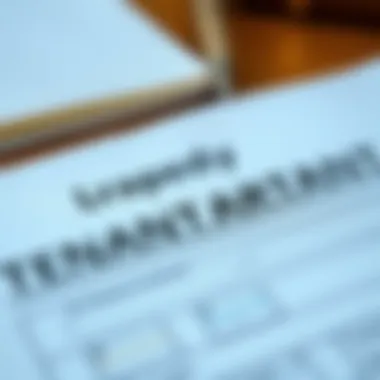Essential Guide to Tenancy Contracts in Dubai


Intro
Understanding the landscape of tenancy contracts in Dubai is crucial for anyone involved in the real estate market, whether you're a seasoned investor, a prospective homebuyer, or a real estate professional. Dubai's renting environment is distinctively vibrant and complex, shaped by its unique legal framework and cultural nuances. With the constant influx of expatriates and a growing population, there's a significant demand for rental properties, which means navigating tenancy agreements can be a daunting task.
This guide aims to equip you with the essentials to grasp the nuances of tenancy contract templates in Dubai. From the pivotal roles that these contracts play in landlord-tenant relationships to the legal implications of each clause, this comprehensive exploration will unearth everything you need to know. Let’s dive deep into this multifaceted subject and unravel the intricacies involved.
Market Trends and Insights
Current Market Analysis
In the current rental market of Dubai, trends reflect a blend of economic resilience and evolving tenant preferences. With the tide of expatriates seeking housing, there's a noticeable shift toward mixed-use developments that provide an array of amenities. Rental prices have seen fluctuations; they have either stabilized or slightly decreased in certain neighborhoods as landlords adapt to market demands. The luxury market remains robust, driven by high-net-worth individuals, while affordable housing options are gaining traction, catering to a broader demographic.
Historical Trends and Future Predictions
Tracking the historical trends in Dubai's rental market reveals how external factors, such as global economic conditions and local policies, influence dynamics. Over the past decade, rental prices have undergone significant transformations, often aligned with large-scale events like the Expo 2020. Moving forward, experts predict that the market will evolve with enhanced regulations and increased transparency. Technology will also play a big role in redefining how properties are listed and transactions are conducted, making it easier for all parties involved.
Property Listings and Comparisons
Luxury Properties Overview
Luxury properties in Dubai continue to draw attention from affluent renters. These high-end rentals often feature state-of-the-art design, breathtaking views, and unparalleled amenities, from private pools to premium concierge services. Areas like Dubai Marina and Palm Jumeirah are hot spots known for their lavish offerings.
- Spacious layouts
- High-end finishes
- Exclusive locations
Affordable Housing Options
On the other end of the spectrum, affordable housing in Dubai is also witnessing a rise. With the government pushing initiatives for middle-income earners, many developments now include budget-friendly units. Areas like Dubai Sports City and International City are popular among families and young professionals looking for value.
- Competitive pricing
- Proximity to schools and shopping options
- Community-oriented designs
As the market continues to shift, understanding these trends and their implications for tenancy contracts is essential for informed decision-making.
Understanding Tenancy Contracts
Entering the realm of real estate in Dubai requires a strong grasp of tenancy contracts. These documents serve as the backbone of landlord-tenant relationships, encapsulating the expectations, rights, and responsibilities of both parties. Understanding tenancy contracts is not merely a formality; it’s an essential part of protecting one's interests in a dynamic rental market.
Definition and Significance
A tenancy contract is essentially a legally binding agreement between a landlord and a tenant. It specifically lays out the terms under which a property is rented. The significance of these contracts cannot be overstated—they serve as a safeguard against misunderstandings and disputes that can arise during the rental period. By formally defining rental terms such as duration, rent amount, and maintenance responsibilities, both parties can operate with clarity.
In a bustling city like Dubai, where the property market can fluctuate significantly, having a well-structured tenancy contract helps ensure smooth sailing. It gives tenants peace of mind, knowing their rights are protected, while also allowing landlords to enforce terms fairly and legally. A robust contract can even play a pivotal role in reinforcing a landlord's position should any disagreements arise. In short, understanding the nuances of tenancy contracts is paramount for anyone looking to navigate the rental landscape in Dubai.
Legal Framework in Dubai
In Dubai, the legal framework governing tenancy agreements is primarily defined by the Dubai Land Department. Regulations are clearly laid out in the Dubai Tenancy Law, which aims to ensure fair practices. Landlords and tenants alike should familiarize themselves with these regulations to avoid any legal pitfalls.
The law addresses critical areas such as the duration of tenancy agreements, grounds for eviction, and rent increments. For instance, it specifies the maximum allowable increase in rent upon lease renewal, which is often a contentious topic. Understanding these legal parameters is crucial in crafting a compliant tenancy contract that stands up to scrutiny.
It’s also worth considering that Dubai operates under various freehold and non-freehold properties. Each category has its own legal implications regarding tenancy agreements, so knowing these distinctions can save time and potential headaches down the line.
Key Stakeholders in Tenancy Agreements
Different stakeholders play pivotal roles in the landscape of tenancy agreements in Dubai:
- Landlords: They seek to safeguard their assets while generating income through rental payments. A well-defined contract is fundamental for protecting their interests.
- Tenants: They aim to secure a stable living situation and clear terms regarding their use of the property. Understanding the contract helps them know their rights, such as repair obligations and eviction terms.
- Real Estate Agents: These professionals often serve as intermediaries, facilitating negotiations and ensuring that agreements meet legal standards. Their expertise can be invaluable for first-time renters or landlords unfamiliar with the market.
- Regulatory Authorities: Bodies like the Dubai Land Department ensure that all contracts comply with the law. They are crucial for conflict resolution should disputes arise.
Components of a Tenancy Contract Template
A tenancy contract template is the backbone of any rental agreement, serving as a standardized document that outlines the rights and responsibilities of both landlords and tenants. It is essential to recognize that a well-structured contract template can facilitate smooth transactions and prevent disputes. Understanding the core components of a tenancy contract is like having a roadmap — it helps navigate the complexities of renting in Dubai.
Parties Involved
In any rental agreement, clearly defining the parties involved is paramount. This typically includes the landlord and the tenant, but it can also extend to any agents acting on behalf of either party. For instance, if a property management company is managing the rental, their details should be explicitly included. Including accurate names and contact information helps in establishing accountability. Failure to properly identify the parties can lead to confusion later on, especially if disputes arise or if legal action is needed.
Additionally, it's advisable to state their roles in the contract distinctly. For example, the landlord should be identified as the 'lessor' while the tenant is the 'lessee'. This linguistic clarity not only sets expectations but also establishes a clear line of communication should any issues develop.
Property Details
The property details section is where the physical and legal specifics of the rental unit are outlined. This includes the property address, type of property—be it an apartment, villa, or studio—and its unique features.
A thorough description can enhance understanding between the parties. For example, instead of simply stating "2-bedroom apartment," the template can provide added detail, such as floor level, amenities available, or any included utilities.


- Example of key details:
- Address: 123 Main Street, Dubai
- Type: 2-Bedroom Apartment
- Features: Swimming pool access, two parking spots, and fully furnished.
Incorporating such details not only protects the tenant’s needs but also aligns with the landlord’s expectations for the property's use. This might help prevent misunderstandings around the scope of use of certain areas or facilities.
Duration of Tenancy
The duration of tenancy is another core component, detailing the starting and ending dates of the agreement. This is critical as it defines the timeline for both parties. Penned clearly, it may state: "The term of this lease shall commence on the 1st of January 2023 and terminate on the 31st of December 2023."
Setting a definitive timeline also establishes expectations about the return of the security deposit, notice periods for either party, and any conditions upon terminating the lease. It’s worth considering that flexibility can occasionally be negotiated. If the tenancy duration is likely to change, including options for renewal or the parameters for early termination should be considered. For example, if a tenant expects to relocate for work, detailing how they can give notice might be useful.
Rent Amount and Payment Terms
Last but certainly not least, the rent amount and payment terms section is the heart of any contract. This should outline the agreed-upon rent, when it is due, and acceptable payment methods. Instead of using vague terminology, the statement should be precise: "The tenant shall pay an amount of AED 85,000 annually, payable in twelve monthly installments of AED 7,083, due on the first of every month."
Additionally, this section may include penalties for late payments, accepted payment modes, and even provisions for rent increases, which might be revisited based on market conditions. Including provisions for rent escalation can provide clarity on how the costs may evolve over time.
Important Note: Clearly articulate the implications of missed payments to avoid misunderstandings. This may include any fees or repercussions, ensuring that both parties understand their financial commitments.
In summary, the components of a tenancy contract template act as the foundational pillars of rental agreements in Dubai. Each element plays a critical role in defining expectations, obligations, and protection against potential disputes. Keeping these specifics transparent and explicit allows both landlords and tenants to enter the contract with a shared understanding, paving the way for a harmonious rental experience.
Legal Requirements for Tenancy Contracts in Dubai
Understanding the legal requirements for tenancy contracts in Dubai is crucial for both landlords and tenants. Complying with these regulations ensures a fair and transparent rental process, minimizing the potential for disputes and legal complications. With a booming real estate market, recognizing these essentials aids stakeholders in making informed decisions and securing their investments legally.
Regulatory Authorities
In Dubai, the legal landscape of tenancy agreements is overseen by various regulatory authorities, ensuring that both parties adhere to the established laws. The most prominent figure in this realm is the Dubai Land Department (DLD), which plays a pivotal role in mortgage registration, rental contracts, and property transactions. The DLD also maintains the Real Estate Regulatory Agency (RERA), which is instrumental in regulating and developing the real estate sector.
Key responsibilities of these authorities include:
- Monitoring compliance with rental laws.
- Providing guidance on tenant-landlord relations.
- Managing the resolution of disputes that may arise during the contract period.
Understanding the function of these agencies helps both landlords and tenants navigate the often complex maze of rental laws in Dubai.
Required Approvals and Registration
When drafting a tenancy contract, specific approvals and registrations are mandatory. For starters, a tenancy contract must be registered with the Dubai Land Department to obtain legal recognition. This registration protects rights and ensures that the agreement is enforceable in a court of law.
The process is relatively straightforward:
- Draft the tenancy contract: Ensure it includes all essential clauses pertaining to the rental agreement.
- Submit the contract to the DLD alongside necessary documentation, such as copy of the tenant's passport and emirates ID, and the property title deed.
- Obtain the official tenancy contract certificate once registration is complete.
This registration not only provides both parties with a clear record of their agreement, but it also ensures protection against illegal eviction and other disputes that may arise.
Furthermore, landlords should note that the DLD may impose penalties for failure to register the contract within a specific timeline, stressing the need for compliance with all legal requirements.
In summary, recognizing the regulatory landscape and adhering to the necessary approvals and registrations form the backbone of securing tenancy contracts in Dubai. This adherence not only fosters trust between parties but also reinforces the overall stability and growth of the real estate market in the region.
Drafting a Tenancy Contract Template
Creating a robust tenancy contract template is an essential task for both landlords and tenants in Dubai. With the city's ever-evolving real estate landscape, having a well-structured agreement not only safeguards rights but also promotes harmonious relationships. A well-drafted template serves as a foundation that clarifies obligations and protects both parties from future disputes.
The importance of this template is magnified by the unique nuances of Dubai's rental market. Unlike other cities, tenants and landlords may find themselves navigating a distinct legal structure, which mandates specific content in the contracts. Ensuring compliance with these local laws is crucial to establish a straightforward and transparent renting process.
Essential Clauses to Include
When constructing a tenancy contract, it is crucial to incorporate specific terms that protect the interests of both parties. Essential clauses generally include:
- Identification of Parties: Full names and contact details of the landlord and tenant.
- Property Description: Accurate details of the property, including its address and any unique features.
- Tenancy Duration: Clearly state the start and end dates, along with any renewal or termination conditions.
- Rent Amount and Payment Terms: Specify the rent, payment method, and any potential increments during the tenancy.
- Security Deposit: Define the amount required, conditions for return, and what it covers.
- Maintenance Responsibilities: Outline who is responsible for repairs and general upkeep of the property.
Including these clauses creates clarity, making it easier for landlords and tenants to reference specific terms, should any disputes arise.
Customizing the Template
Customization of the tenancy contract template can make a world of difference. Each rental situation is unique, and it's important to craft terms that fit the specific arrangement. Important factors to take into consideration include:
- Nature of the Property: Different properties may require different terms. For instance, a furnished apartment would have different considerations than an unfurnished one.
- Target Demographic: If renting to families versus professionals, tailor language and terms to be more suitable for the intended tenants.
- Local Customs: Certain practices may vary within different neighborhoods in Dubai. Adapting the contract to reflect local norms can aid in smoother negotiations.
Customization can be as simple as modifying existing clauses or adding new ones that address unique needs. Ensuring that the contract reflects both parties’ expectations is key to a successful tenancy.
Common Mistakes to Avoid
Even seasoned landlords and tenants can stumble during the drafting phase. Being aware of common pitfalls can prevent misunderstandings down the road. Here are mistakes to watch out for:


- Vague Language: Avoid ambiguous terms that can lead to confusion. The more precise the wording, the less room there is for interpretation.
- Ignoring Local Regulations: Not being familiar with Dubai’s housing laws can lead to unenforceable contracts. Always ensure that the template aligns with local legal standards.
- Neglecting to Update: If the template has served well in the past, don’t assume it still works perfectly. Regularly review and adjust as necessary to account for any changes in legislation or market norms.
- Overlooking Dispute Resolution: A contract without a clear plan for handling conflicts can result in lengthy disputes. Including mediation or arbitration clauses can help define how issues will be addressed.
With careful attention to these areas, the drafting of a tenancy contract template can serve as an effective tool for successful relationships between landlords and tenants in Dubai.
Best Practices for Landlords
When it comes to navigating the intricate world of rental agreements in Dubai, landlords must tread thoughtfully. Utilizing best practices not only ensures smooth operations but also fosters positive relationships with tenants. This not only enhances tenant retention but also maintains the property's value. Understanding these best practices can help prevent legal troubles and disputes down the line, creating a harmonious renting environment.
Ensuring Compliance with Local Laws
Keeping in line with local laws is paramount for landlords in Dubai. The legal landscape in the UAE is quite distinct, and landlords should stay updated on specific regulations laid out by the Real Estate Regulatory Agency (RERA). Understanding and abiding by these laws ensures that the tenancy agreements are not only valid but also protect the landlord’s rights.
- Know Your Laws: Familiarize yourself with the Tenancy Law (Law No. 26 of 2007) and its amendments. This will help you avoid unintentional violations.
- Registration of Contracts: It's crucial to register the tenancy contract through the Ejari system, as this adds legal weight to your agreement and protects both parties.
- Regular Updates on Regulations: The legal environment can change swiftly. Consider subscribing to relevant newsletters or joining landlord associations to stay informed.
Staying compliant helps safeguard your investment and promotes a fair rental market, hence, creating a qualified tenant base.
Communication and Relationship Management
An often-overlooked aspect of being a successful landlord is effective communication. Building a good rapport with tenants can lead to easier dealings and a more pleasant living environment.
- Open Lines of Communication: Always be accessible to your tenants. Whether it's through text messages, emails, or direct calls, ensure they can reach you easily. Good communication builds trust.
- Regular Check-Ins: Conduct periodic inspections and check-ins not only to ensure the property is well-maintained but also to show tenants that you care about their living conditions. This goes a long way in retaining good tenants.
"Effective communication is the bedrock of a strong landlord-tenant relationship; it mitigates misunderstandings and nurtures trust."
- Prompt Repairs and Maintenance: Address any maintenance requests swiftly. Tenants largely appreciate landlords who prioritize their comfort. Not only does this prompt a timely response to problems, but it also reflects positively on you as a landlord.
Implementing these best practices creates a landscape where both landlords and tenants can thrive. The foundation you lay will be significant in the overall success of your rental business.
Best Practices for Tenants
Navigating the rental landscape in Dubai can be a bit of a minefield, especially for newcomers. As a tenant, it’s imperative to arm yourself with the right knowledge and best practices that can help ensure a smoother renting experience. Knowing your rights and responsibilities, alongside effective negotiation strategies, forms the backbone of a positive landlord-tenant relationship in this vibrant city.
Understanding Rights and Responsibilities
In the bustling environment of Dubai's rental market, tenants often overlook their rights and responsibilities, which can lead to problems down the line. It's essential to be well-informed about what you are entitled to as a tenant. For instance, tenants have the right to a habitable living condition, meaning the property must be safe and suitable to live in. This includes access to essential services like water, electricity, and basic maintenance.
On another note, responsibilities also come into play. As a tenant, you’re expected to pay your rent on time, maintain the property, and adhere to the terms outlined in your tenancy contract. Failing to do so can result in disputes or even eviction. Understanding these aspects helps create a solid foundation for communication with your landlord, minimizing misunderstandings that could spiral into larger issues.
"Knowledge is power, especially in the complex world of real estate."
To broaden this understanding, consider familiarizing yourself with the specific laws that govern tenancy agreements in Dubai, such as regulations enforced by the Real Estate Regulatory Agency (RERA). Websites like gov.ae can provide comprehensive information on tenant rights, while forums such as reddit.com may offer insights from other tenants' experiences.
Negotiating Lease Terms
Negotiating lease terms is often seen as a daunting task, yet it’s one of the most critical steps tenants can take to safeguard their interests. Whether you’re renting an apartment in Business Bay or a villa in Jumeirah, you should be prepared to discuss lease terms effectively.
When it comes to negotiation, clarity is king. Before you step into discussions with your landlord, have a clear list of what you want to negotiate. This could include:
- Rent amount: Know the market rates for similar properties to strengthen your bargaining position.
- Duration of the lease: If you're unsure about your long-term plans, you might prefer a shorter lease term with the option to renew.
- Maintenance responsibilities: Clarify who manages repairs and upkeep to avoid future disputes.
It’s beneficial to approach negotiations with a cooperative attitude rather than an adversarial one. Establishing rapport can foster an amicable environment, making the landlord more willing to accommodate your requests. If you approach them with flexibility and demonstrate a willingness to understand their position, they may be more amenable to adjustments.
In summary, navigating the rocky waters of tenant-landlord negotiations requires both knowledge and strategy. Equip yourself with information on your rights, clear responsibilities, and the art of negotiation. Keeping the lines of communication open will cultivate a more positive living situation and may even lead to a more favorable living arrangement.
Resolving Disputes in Tenancy Agreements
Resolving disputes in tenancy agreements is not just a procedural formality, but a crucial aspect that can significantly impact landlords and tenants alike. When issues arise, it is vital for both parties to have clear avenues for resolution. This ensures that misunderstandings do not escalate into larger conflicts, which could result in financial losses or even legal ramifications. Understanding the common sources of conflict and knowing the legal channels available for resolution empowers both landlords and tenants, fostering a healthier rental environment.
Common Sources of Conflict
Disputes in tenancy agreements often stem from a variety of sources. Some of the most prevalent issues include:
- Non-Payment of Rent: This is the most frequently reported conflict. Tenants may face unexpected financial difficulties, leading to missed payments. Landlords, on the other hand, may feel the pinch if cash flow is affected.
- Maintenance Issues: Problems related to property upkeep can lead to disagreements. A tenant might expect quick repairs, while a landlord may argue about the timelines or responsibilities for certain maintenance tasks.
- Breach of Contract: Sometimes, tenants breach terms of the lease, like keeping pets in pet-free properties. Such alterations can lead to animosity between the parties.
- Disputes Over Security Deposits: After a tenant vacates, disagreements over the return of the security deposit are common. Landlords often cite damages while tenants may claim normal wear and tear.
- Notice Period Conflicts: Issues may arise regarding the notice period for terminating the lease. Misunderstandings about how much notice is required can create unnecessary tension.
A proactive approach to these matters—by having well-drafted tenancy contracts—can help prevent potential conflicts. But when they arise, knowing how to tackle these issues is key.
Legal Channels for Resolution
When disputes escalate beyond discussion, there are several legal avenues that landlords and tenants can pursue:
- Mediation: This is often the first step in resolving disputes. Mediation involves a neutral third party who helps facilitate a conversation between landlords and tenants to reach a mutually satisfactory agreement.
- RERA (Real Estate Regulatory Agency): In Dubai, RERA serves as an important resource for resolving tenancy disputes. This authority provides a framework for mediation and adjudication of disputes. Tenants and landlords can file a formal complaint through RERA to seek help.
- Court Proceedings: If all else fails, the dispute may end up in court. Both parties can raise their issues in a rental dispute court where a judge will make a final ruling. This route can be more time-consuming and costly but may be necessary for serious breaches.
- Arbitration: A less common approach where both parties agree to let an arbitrator make a legally binding decision. This is generally quicker than court proceedings and can help save on legal fees.


"Addressing disputes effectively can save relationships and funds. The goal should always be to reach a satisfactory agreement without escalating tensions unnecessarily."
In summary, recognizing common sources of conflict within tenancy agreements and being aware of the legal channels for resolution is essential. Both landlords and tenants must communicate effectively and utilize available resources to resolve disputes while maintaining a healthy rental relationship.
Case Studies
The significance of case studies in the realm of tenancy contracts cannot be overstated. They serve as practical illustrations that bridge the gap between theoretical frameworks and real-world applications. By examining specific instances of tenancy agreements, the readers gain valuable insights into how various factors interplay in actual scenarios. Additionally, these case studies can highlight the successes and pitfalls experienced by landlords and tenants alike, ensuring that the audience is better equipped to navigate their own issues.
"Learning from others' experiences often saves us from making the same mistakes."
Successful Tenancy Agreements
Successful tenancy agreements are more than just pieces of paper. They embody a mutual understanding between the parties involved and lay down a foundation of trust. A notable example can be seen in a specific case involving a family renting a villa in Dubai's Jumeirah district. They signed a comprehensive contract that clearly delineated all responsibilities, from property maintenance to payment dates. Because everything was documented, even minor conflicts about repairs were resolved swiftly, fostering a harmonious relationship.
In another instance, a real estate company was involved in accommodating a group of expatriates. They tailored the tenancy agreements to include provisions relevant to the unique needs of the international community, such as flexible lease duration and provisions for family amenities. This not only attracted more clients but also led to long-term renters, proving that customization in tenancy agreements can be highly beneficial.
Benefits of Studying Successful Agreements
- Clarity in Contractual Terms: Successful cases often exhibit crystal-clear terms, which help prevent misunderstandings.
- Effective Communication: They show how open lines of communication can foster positive outcomes.
- Responsiveness to Needs: Tailoring agreements to reflect the individuals’ situations can lead to better satisfaction for all parties.
Dispute Resolution Examples
Disagreements are a part and parcel of any rental agreement, but how they are managed can determine the relationship's outcome. One compelling example involves a dispute over rental increases. In this case, tenants found themselves facing unexpected hikes in rent. However, the landlord had included a clause in the agreement about prior communication and stipulated a reasonable notice period. This led to calmer discussions and ultimately a middle ground being reached, showcasing the importance of foresight in contract drafting.
Another case highlighted a confrontation regarding a security deposit. A tenant believed they were entitled to the entire amount back at lease end; however, the landlord cited clauses for damages. Because the agreement outlined the conditions under which deductions could be made, they had a structured guide to follow, facilitating a more straightforward resolution without escalation to legal channels.
Factors Influencing Effective Dispute Resolution
- Clarity of Contract Terms: As seen in both examples, clear terms often preempt issues.
- Crafted Resolution Processes: Having predetermined steps for resolving conflicts can streamline the process.
- Engagement in Dialogue: Open communication channels foster collaboration rather than confrontation.
In summary, case studies in tenancy contracts are incredibly illuminating. They not only present a catalog of dos and don’ts but also underline the necessity of good practices that can enhance rental experiences in Dubai. Investors, realtors, homebuyers, developers, and analysts stand to gain from these insights, equipping them with the knowledge to make informed decisions in a complex market.
Future Trends in Dubai's Tenancy Market
As Dubai's real estate landscape evolves, it becomes crucial to stay ahead of the curve regarding tenancy agreements. The market is constantly adapting due to changing technologies, regulations, and tenant preferences. Understanding these trends will benefit landlords, tenants, and real estate professionals. Investing time to familiarize oneself with these shifts can lead to better decisions, improved tenant relations, and ultimately, increased profitability.
Impact of Technology on Tenancy Contracts
In recent years, technology has made significant strides in transforming the management of tenancy contracts. One significant trend is the rise of digital documentation. Gone are the days when extensive paperwork was a norm. Many landlords and tenants can now sign contracts online using secure platforms. This not only simplifies the process but also reduces the risk of losing important documents.
With the implementation of blockchain technology, enhanced security is a key advantage. Contracts stored on a blockchain are immutable, meaning no one can alter them without detection. This boosts trust between parties, ensuring compliance and accountability.
Additionally, property management software can help in automating reminders for rent payments and lease renewals. Such efficiency can prevent misunderstandings and disputes. Here's a look at some aspects where technology is making waves:
- Online Platforms: Websites and mobile apps that streamline the rental process.
- Virtual Tours: Potential tenants can view properties remotely, saving time for both landlords and tenants.
- Data Analytics: These can provide insights on market trends, enabling smarter pricing strategies.
All in all, technology in tenancy contracts not only fosters convenience but also enhances trust and efficiency.
Evolving Tenant Expectations
As the demographics of tenants in Dubai shift, so do their expectations. Today's renters often prioritize flexibility and personal choice. For instance, many are looking for short-term leasing agreements rather than long-term contracts. This reflects a broader trend towards mobility and transient lifestyles.
In addition, transparency has taken center stage. Tenants want to be fully informed about their obligations, amenities, and the property itself. A clear and concise tenancy contract that outlines all terms, including potential fees, is essential for building trust. Many tenants these days also expect features such as maintenance guarantees or renewable terms without hefty penalties.
Moreover, sustainability and energy efficiency are key factors for a growing number of tenants. They seek homes that align with their environmentally conscious values. This expectation paves the way for landlords to become more proactive about enhancing the ecological footprint of their properties.
In brief, understanding these evolving expectations helps landlords to tailor their offerings, ultimately enhancing the tenant experience and ensuring long-term retention.
"In the world of real estate, adapting to the changing needs of tenants is not just smart; it's essential for success."
End
In closing, understanding tenancy contracts in Dubai is a critical aspect for all parties involved in rental agreements. The conclusion of this article highlights the essentials for both tenants and landlords, emphasizing the need for a clear understanding of rights and responsibilities. By comprehending the structure and components of tenancy agreements, individuals can effectively navigate their rental journeys. Moreover, the legal landscape in Dubai provides vital protection, ensuring that both landlords and tenants have recourse should disputes arise.
Recap of Key Points
- Legal Framework: The regulations governing tenancy contracts in Dubai are vital, as they set the groundwork for landlord and tenant rights.
- Essential Components: A well-drafted tenancy contract should outline crucial details such as the rental price, duration, and responsibilities of each party.
- Best Practices: Emphasizing compliance with local laws cultivates positive relationships and minimizes conflicts, showcasing the importance of clear communication.
- Future Trends: With technology reshaping how rental agreements are managed, staying updated on these trends will be beneficial for everyone involved.
Final Thoughts on Tenancy in Dubai
Tenancy in Dubai poses unique challenges and opportunities. As the city continues to grow, understanding the nuances of tenancy contracts becomes even more pertinent. Engaging with professionals, understanding the local market, and keeping abreast of evolving regulations can significantly enhance the rental experience. For investors, realtors, and homebuyers alike, being informed means making better decisions that can lead to fruitful outcomes. In essence, being proactive in understanding tenancy contracts not only protects your interests but also fosters a respectful and fair rental environment.
"The key to a successful tenancy lies in clarity and mutual respect between landlords and tenants."
For further details, you might find these resources helpful:
- [Wikipedia on Tenancy] (https://en.wikipedia.org/wiki/Tenancy)
- Dubai Real Estate Laws
- Global Real Estate Trends
- Reddit Discussions on Tenancy
By focusing on the crucial elements of tenancy contracts, investors, realtors, homebuyers, developers, and analysts can equip themselves with knowledge that serves to simplify and enhance their interactions within the vibrant Dubai rental market.















